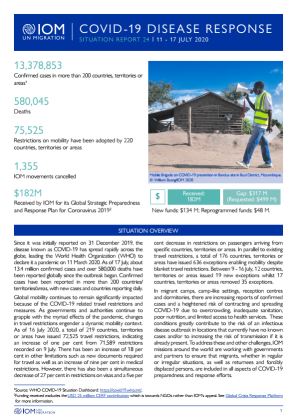-
Countries
-
Data and Analysis
-
Special Focus
-
Crisis Responses
IOM COVID 19 Response - Situation Report 24 (17 July 2020)

Contacto
COVID Response HQ - covid19ops@iom.int
Idioma
English
Ubicación
Global
Fecha de instantánea
Jul 11 2020
Jul 17 2020
Actividad
- Other
Since it was initially reported on 31 December 2019, the disease known as COVID-19 has spread rapidly across the globe, leading the World Health Organization (WHO) to declare it a pandemic on 11 March 2020. As of 17 July, about 13.4 million confirmed cases and over 580,000 deaths have been reported globally since the outbreak began. Confirmed cases have been reported in more than 200 countries/territories/areas, with new cases and countries reporting daily.
Global mobility continues to remain significantly impacted because of the COVID-19 related travel restrictions and measures. As governments and authorities continue to grapple with the myriad effects of the pandemic, changes in travel restrictions engender a dynamic mobility context. As of 16 July 2020, a total of 219 countries, territories or areas have issued 72,525 travel restrictions, indicating an increase of one per cent from 71,589 restrictions recorded on 9 July. There has been an increase of 18 per cent in other limitations such as new documents required for travel as well as an increase of nine per cent in medical restrictions. However, there has also been a simultaneous decrease of 27 per cent in restrictions on visas and a five per cent decrease in restrictions on passengers arriving from specific countries, territories or areas. In parallel to existing travel restrictions, a total of 176 countries, territories or areas have issued 636 exceptions enabling mobility despite blanket travel restrictions. Between 9 - 16 July, 12 countries, territories or areas issued 19 new exceptions whilst 17 countries, territories or areas removed 35 exceptions.
In migrant camps, camp-like settings, reception centres and dormitories, there are increasing reports of confirmed cases and a heightened risk of contracting and spreading COVID-19 due to overcrowding, inadequate sanitation, poor nutrition, and limited access to health services. These conditions greatly contribute to the risk of an infectious disease outbreak in locations that currently have no known cases and/or to increasing the risk of transmission if it is already present. To address these and other challenges, IOM missions around the world are working with governments and partners to ensure that migrants, whether in regular or irregular situations, as well as returnees and forcibly displaced persons, are included in all aspects of COVID-19 preparedness and response efforts.
